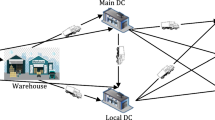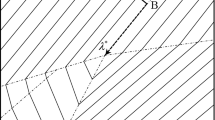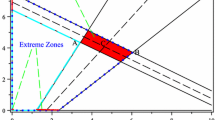Abstract
In this paper, we propose partition-based decomposition algorithms for solving two-stage stochastic integer program with continuous recourse. The partition-based decomposition method enhance the classical decomposition methods (such as Benders decomposition) by utilizing the inexact cuts (coarse cuts) induced by a scenario partition. Coarse cut generation can be much less expensive than the standard Benders cuts, when the partition size is relatively small compared to the total number of scenarios. We conduct an extensive computational study to illustrate the advantage of the proposed partition-based decomposition algorithms compared with the state-of-the-art approaches.
Similar content being viewed by others
References
Ahmed, S., Garcia, R., Kong, N., Ntaimo, L., Parija, G. R., Qiu, F. (2015). A stochastic integer programming test problem library, http://www.isye.gatech.edu/~sahmed/siplib.
Albornoz, V. M., Benario, P., & Rojas, M. E. (2004). A two-stage stochastic integer programming model for a thermal power system expansion. International Transactions in Operational Research, 11(3), 243–257.
Benders, J. F. (1962). Partitioning procedures for solving mixed-variables programming problems. Numerische Mathematik, 4(1), 238–252.
Bienstock, Daniel, & Zuckerberg, Mark (2010). Solving LP relaxations of large-scale precedence constrained problems. IPCO 1–14.
Birge, J. R., & Louveaux, F. (2011). Introduction to stochastic programming. Berlin: Springer Science & Business Media.
Bodur, M., Dash, S., Günlük, O., & Luedtke, J. (2016). Strengthened benders cuts for stochastic integer programs with continuous recourse. INFORMS Journal on Computing, 29(1), 77–91.
Bodur, Merve, Luedtke, James R (2016). Mixed-integer rounding enhanced benders decomposition for multiclass service-system staffing and scheduling with arrival rate uncertainty. Management Science.
Bonnans, J.-F., Gilbert, J. C., Lemaréchal, C., & Sagastizábal, C. (2006). Numerical optimization: theoretical and practical aspects. Berlin: Springer.
Contreras, I., Cordeau, J.-F., & Laporte, G. (2011). Benders decomposition for large-scale uncapacitated hub location. Operations Research, 59(6), 1477–1490.
de Oliveira, W., & Sagastizábal, C. (2014). Level bundle methods for oracles with on-demand accuracy. Optimization Methods and Software, 29(6), 1180–1209.
de Oliveira, W., Sagastizábal, C., & Scheimberg, S. (2011). Inexact bundle methods for two-stage stochastic programming. SIAM Journal on Optimization, 21(2), 517–544.
Espinoza, D., & Moreno, E. (2014). A primal-dual aggregation algorithm for minimizing conditional-value-at-risk in linear programs. Computational Optimization and Applications, 59, 617–638.
Fragniere, E., Gondzio, J., & Vial, J.-P. (2000). Building and solving large-scale stochastic programs on an affordable distributed computing system. Annals of Operations Research, 99(1–4), 167–187.
Higle, J. L., & Sen, S. (1991). Stochastic decomposition: An algorithm for two-stage linear programs with recourse. Mathematics of Operations Research, 16(3), 650–669.
Hiriart-Urruty, J.-B., & Lemaréchal, C. (2013). Convex analysis and minimization algorithms I: Fundamentals. Berlin: Springer science & business media.
Kim, K., & Mehrotra, S. (2015). A two-stage stochastic integer programming approach to integrated staffing and scheduling with application to nurse management. Operations Research, 63(6), 1431–1451.
Jesús, M. L., Cerisola, S., Ramos, A., & Palacios, R. (2009). Analysis of stochastic problem decomposition algorithms in computational grids. Annals of Operations Research, 166(1), 355–373.
Lemaréchal, C., Nemirovskii, A., & Nesterov, Y. (1995). New variants of bundle methods. Mathematical Programming, 69(1–3), 111–147.
Linderoth, J., Shapiro, A., & Wright, S. (2006). The empirical behavior of sampling methods for stochastic programming. Annals of Operations Research, 142, 215–241.
Louveaux, F. V. (1986). Discrete stochastic location models. Annals of Operations Research, 6(2), 21–34.
Ruszczyński, A. (1986). A regularized decomposition method for minimizing a sum of polyhedral functions. Mathematical Programming, 35(3), 309–333.
Ruszczyński, A., & Świetanowski, A. (1997). Accelerating the regularized decomposition method for two stage stochastic linear problems. European Journal of Operational Research, 101(2), 328–342.
Saharidis, G. K. D., Minoux, M., & Ierapetritou, M. G. (2010). Accelerating benders method using covering cut bundle generation. International Transactions in Operational Research, 17(2), 221–237.
Sen, S. (1993). Subgradient decomposition and differentiability of the recourse function of a two stage stochastic linear program. Operations Research Letters, 13(3), 143–148.
Shapiro, A., Dentcheva, D., & Ruszczyński, A. (2009). Lectures on Stochastic programming: Modeling and theory. Philadelphia: SIAM.
Song, Y., & Luedtke, J. (2015). An adaptive partition-based approach for solving two-stage stochastic programs with fixed recourse. SIAM Journal on Optimization, 25(3), 1344–1367.
Trukhanov, S., Ntaimo, L., & Schaefer, A. (2010). Adaptive multicut aggregation for two-stage stochastic linear programs with recourse. European Journal of Operational Research, 206(2), 395–406.
van Ackooij, Wim, de Oliveira, Welington, Song, Yongjia (2016). An adaptive partition-based level decomposition for solving two-stage stochastic programs with fixed recourse. Submitted for publication.
Van Der Walt, S., Colbert, S. C., & Varoquaux, G. (2011). The numpy array: A structure for efficient numerical computation. Computing in Science and Engineering, 13(2), 22–30.
Van Slyke, R. M., & Wets, R. (1969). L-shaped linear programs with applications to optimal control and stochastic programming. SIAM Journal on Applied Mathematics, 17(4), 638–663.
Wolf, C., Fábián, C. I., Koberstein, A., & Suhl, L. (2014). Applying oracles of on-demand accuracy in two-stage stochastic programming - A computational study. European Journal of Operational Research, 239(2), 437–448.
Wolf, C., & Koberstein, A. (2013). Dynamic sequencing and cut consolidation for the parallel hybrid-cut nested L-shaped method. European Journal of Operational Research, 230(1), 143–156.
You, F., & Grossmann, I. E. (2013). Multicut benders decomposition algorithm for process supply chain planning under uncertainty. Annals of Operations Research, 210(1), 191–211.
Zhu, X., & Sherali, H. D. (2009). Two-stage workforce planning under demand fluctuations and uncertainty. Journal of the Operational Research Society, 60(1), 94–103.
Zverovich, V., Fábián, C. I., Ellison, E. F. D., & Mitra, G. (2012). A computational study of a solver system for processing two-stage stochastic LPs with enhanced benders decomposition. Mathematical Programming Computation, 4(3), 211–238.
Acknowledgements
The authors acknowledge partial support by the National Science Foundation under grant CMMI 1562245. Any opinions, findings, and conclusions or recommendations expressed in this material are those of the authors and do not necessarily reflect the views of the National Science Foundation. The authors greatly appreciate valuable comments and suggestions from the editors and two anonymous referees.
Author information
Authors and Affiliations
Corresponding author
Rights and permissions
About this article
Cite this article
Pay, B.S., Song, Y. Partition-based decomposition algorithms for two-stage Stochastic integer programs with continuous recourse. Ann Oper Res 284, 583–604 (2020). https://doi.org/10.1007/s10479-017-2689-7
Published:
Issue Date:
DOI: https://doi.org/10.1007/s10479-017-2689-7




